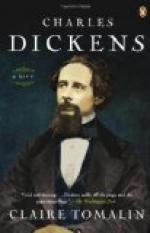FOOTNOTES:
[14] “Dickens in Camp.”
[15] Dickens himself knew that he had a tendency to fall into blank verse in moments of excitement, and tried to guard against it.
[16] M. Daudet, in many respects a follower of Dickens, is a fine and notable exception.
CHAPTER VI.
The last number of “Barnaby Rudge” appeared in November, 1841, and, on the 4th of the following January Dickens sailed with his wife for a six months’ tour in the United States. What induced him to undertake this journey, more formidable then, of course, than now?
Mainly, I think, that restless desire to see the world which is strong in a great many men, and was specially strong in Dickens. Ride as he might, and walk as he might, his abounding energies remained unsatisfied. In 1837 there had been trips to Belgium, Broadstairs, Brighton; in 1838 to Yorkshire, Broadstairs, North Wales, and a fairly long stay at Twickenham; in 1839 a similar stay at Petersham—where, as at Twickenham, frolic, gaiety and athletics had prevailed,—and trips to Broadstairs and Devonshire; in 1840 trips again to Bath, Birmingham, Shakespeare’s country, Broadstairs, Devonshire; in 1841 more trips, and a very notable visit to Edinburgh, with which Little Nell had a great deal to do. For Lord Jeffrey was enamoured of that young lady, declaring to whomsoever would hear that there had been “nothing so good ... since Cordelia;” and inoculating the citizens of the northern capital with his enthusiasm, he had induced them to offer to Dickens a right royal banquet, and the freedom of their city. Accordingly to Edinburgh he repaired, and the dinner took place on the 26th of June, with three hundred of the chief notabilities for entertainers, and a reception such as kings might have envied. Jeffrey himself was ill and unable to take the chair, but Wilson, the leonine “Christopher North,” editor of Blackwood, and author of those “Noctes Ambrosianae” which were read so eagerly as they came out, and which some of us find so difficult to read now—Wilson presided most worthily. Of speechifying there was of course much, and compliments abounded. But the banquet itself, the whole reception at Edinburgh was the most magnificent of compliments. Never, I imagine, can such efforts have been made to turn any young man’s brain, as were made, during this and the following year, to turn the head of Dickens, who was still, be it remembered, under thirty. Nevertheless he came unscathed through the ordeal. A kind of manly genuineness bore him through. Amid all the adulation and excitement, the public and private hospitalities, the semi-regal state appearance at the theatre, he could write, and write truly, to his friend Forster: “The moral of this is, that there is no place like home; and that I thank God most heartily for having given me a quiet spirit and a heart that won’t hold many people. I sigh for Devonshire Terrace and Broadstairs, for battledore and shuttlecock; I want to dine in a blouse with you and Mac (Maclise).... On Sunday evening, the 17th July, I shall revisit my household gods, please heaven. I wish the day were here.”




